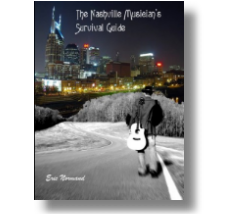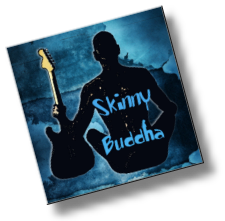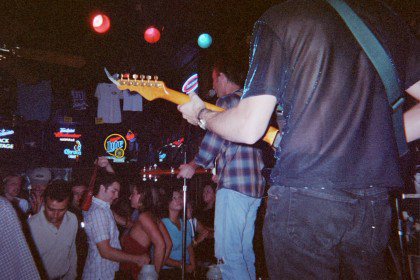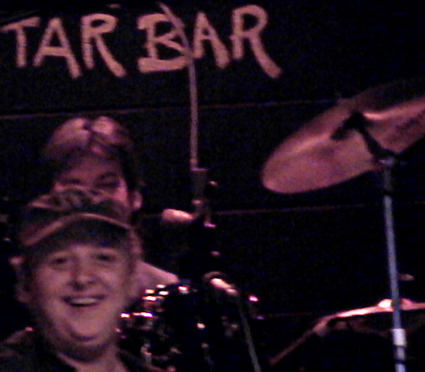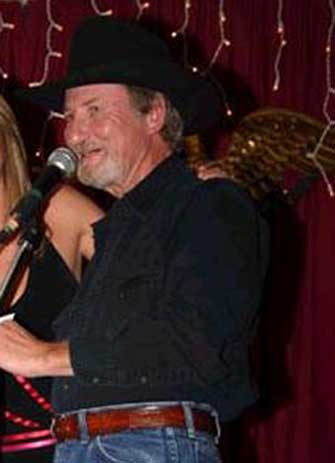
Back in 2009, I began putting together a list of people to interview for my book, The Nashville Musician’s Survival Guide, and my friend, Mike was at the top of this list. Those of you who knew Mike know that he was a very caring, giving, and humble human being. The interview he gave was not only insightful for aspiring musicians, but also a wonderful insight into his musical journey. Although he has now gone on to a better place, his music can still be heard, and his magical essence still shines through the words on these pages. It is with that spirit that I’d like to share his words with you all. Mike touched so many lives, and we are all the better for it. I miss my friend.
Use the buttons at the top or bottom of each page to move to the next page; the full interview is around 10 pages long.
Have you ever played a gig that seemed to go on forever? I’m not talking about your typical three to four hour bar band performance that occasionally might drag a little in the middle, or some uninspired club gig full of “T n’ A” (tables and ashtrays). No, I’m talking about a gig that goes on for hours and hours, eight hours to be exact, by the end of which you felt like you aged 10 years. A few years back I did a few gigs like this, and lived to tell about it.
With thousands of singers and musicians trying to break into the Nashville nightclub scene and only so many potential gigs, the scene here can be quite competitive. And if you’ve been in Nashville for a while, you know all too well that these clubs are not known for their “great pay”. These two facts combined might cause some players to take on gigs that, in another part of the country, would be laughed 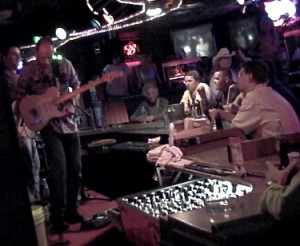 out the door.
out the door.
Don’t get me wrong; there are some club gigs around town that can be lucrative, a few even providing a guarantee of $100 or more per player. But most club gigs in Nashville are tips only, or provide a minimal base pay (usually $20-$50 per player), plus tips. So if you want to make some decent money, you really have to hustle.
Relying on tips causes many club bands to play a three to four hour shift without taking a break, and if a player needs to go to the bathroom the singer might do a few acoustic numbers to provide the band with at least one “pee break”. Relying so greatly on the tip jar for income also causes some singers and bands to exclusively cater to the tourists, choosing worn out dance floor classics like “Margaritaville”, “Sweet Home Alabama” and “Mustang Sally” to keep them happily bopping along.
Several years back I was working pretty steadily downtown, playing a lot of shifts at Tootsies, the Second Fiddle, and a few others on the strip. Around the same time there was another club just a few streets off of Broadway at which I also began performing (to save face, this club will remain anonymous, although its identity will be obvious to anyone who has ever worked this gig). For the purposes of this blog, I will refer to the club owner as “Harry” and the club as “Harry Houdini’s”.
I got to know Harry by hanging out at his club and sitting in on occasion. He liked my playing, and when the guitarist in his weekend house band quit, he offered me the spot. I was hungry for good paying work, and he offered to pay me $125 a night – straight pay with no tips. By Nashville standards, this was great pay for an in-town club gig. There was just one catch – the band was required to play from 7 PM to 3 AM. What?
“Don’t worry, I’ll give you plenty of breaks” Harry assured me. “You can even play sitting on a stool when you get tired”.
Like I said, good paying gigs are hard to find in Nashville, and at this point in time I really needed the dough. Besides, I had already experienced playing some “doubles” on Broadway (for those of you not in the know, this is two shifts back to back, with about a 30 minute break in between shows for change over). The doubles were hard work, but I had built up the necessary stamina, and the extra pay was helping. So what the hell, it can’t be much worse than a double, why not give it a shot?
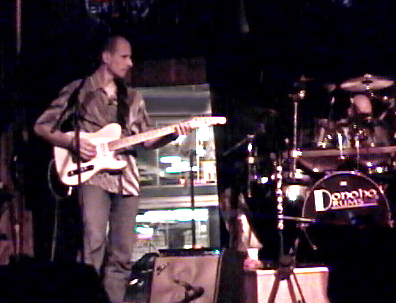 The day of my first gig at this fine establishment I arrived about 20 minutes early, loaded in my gear, and anxiously awaited downbeat. The group consisted of drums, bass, me on guitar, and a singer who also played acoustic. The song list was typical of downtown cover music – classic and new country, pop and rock, and for the first couple of hours, it seemed like just another typical bar gig in Nashville. I even got to take a short break around nine.
The day of my first gig at this fine establishment I arrived about 20 minutes early, loaded in my gear, and anxiously awaited downbeat. The group consisted of drums, bass, me on guitar, and a singer who also played acoustic. The song list was typical of downtown cover music – classic and new country, pop and rock, and for the first couple of hours, it seemed like just another typical bar gig in Nashville. I even got to take a short break around nine.
Then the dynamic of the night began to change. Harry, the club owner, was also a musician, and he came up and sang a set with the band. Some of the songs we played were the previously mentioned classics of “Margaritaville”, “Sweet Home”, and “Mustang Sally”, but we also added to the mix other worn-out wonders like “Brown Eyed Girl”, “Family Tradition”, and the often dreaded “You Never Even Called Me by My Name”.
It was a warm Friday night and the crowd, which seemed to be mainly tourists, seemed happy with what we were doing, we even got a dance floor going. The singer/owner finished his set and went back to work behind the bar, and the other singer came back to take over for a while. Another 45 minutes or so and we got our next pee break while the singer sang a couple tunes solo with his acoustic.
It was now after 11 o’clock, about the average length of a typical bar gig, and Harry again returned to the stage. To my surprise, this next set contained several of the same songs that we played in his first set, most of them being the aforementioned “classics”, a couple of which had also been covered by the other singer.
On our next pee break, sometime around 12:30 AM, I mentioned to the drummer something like “Boy he really likes those oldies. Does he always repeat those songs so much?”
“You ain’t seen nothin’ yet, we’re just getting started. Typically, he wants us to play Margaritaville, Sweet Home, Mustang Sally and Family Tradition about once an hour.” he said to my amazement. “His theory is that the tourists love these songs, and that with the high turnover, it doesn’t really matter how many times we play them.”
Ooookaaay.
Moments later I resumed my perch on the stage to continue my birds-eye view of this top 40 adventure, one that seemed to be entering some kind of classic-hit time warp. I remember looking up at the clock behind the bar a little while later and it reading something like 12:48. Except for the three or four 10 minute pee breaks, I had been playing this gig for about six hours, with two more hours to go, and it began to feel like I had been on the stage for days.
The crowd was now pretty thin, but we marched on. With Harry back on the mic, he asked the crowd “do we have any Lynyrds Skynyrd fans in the house?” With a couple of random cheers forthcoming, we launched into Sweet home Alabama again, now for the fifth time. The same thing happened with some of the other classics. I looked up at the clock a little while later and it was around 1:30. The more we kept repeating songs, the slower the clock seemed to move. At one point my mind flashed to the scene in the movie “Risky Business”, where the character played by Tom Cruise witnesses the clock going backwards right before the bell was supposed to ring.
By the end of the night, I was drenched in sweat and physically and mentally exhausted. My back was sore, my fingers shredded, and my mind numb. We had played Sweet Home Alabama, Mustang Sally, and Family Tradition seven times each throughout the night. Some of the other songs we played four to five times a piece. The funny thing was, the patrons never seemed to notice or care. Harry was right; there was a high turnover, and whatever crowd we had at any given moment seemed to enjoy the songs.
I collected my pay and went home, returning the next evening to do it all over again. As lucrative for an in-town gig as this was, I only lasted a few short weekends before moving onto something else. After a few years I was able to get over my “classic hits overdose”, but for the months following this episode, I suffered severe flashbacks every time somebody called out Sweet Home Alabama and Mustang Sally.
Last Saturday saw another outing of my new trio when we played to another standing room only, sold-out show at the Fillin’ Station in Kingston Springs, TN and boy was it fun! Okay, maybe it wasn’t standing room only, but I always wanted to say that, and besides, we played like it was a full house. It was another cold, wintry Saturday night in middle Tennessee and we had just received our seventh snow storm of the season a few days prior (it’s already snowed more times this winter than it had in the previous seven since I’ve been here). So we were feeling a little housebound and it was good to get out and play.
“It’s like eating ice cream.” That’s how Mike Chapman, my good friend and bassist in this project, described our band and the gig after the show – it’s as fun as fun can ever be, and it comes without any real purpose or pretense other than to simply be fun. At this point of my career, and life for that matter, outings with this trio are perhaps the most enjoyable experiences I ever have when it comes to playing music. Not that my other musical activities and work aren’t fun, I have found a way to enjoy just about every musical situation at this point, but many of them are on somebody else’s dime, and that almost always creates a whole other mindset and set of expectations.
Take my job with Rhett Akins for example. It’s a great job, we go on the road couple of times a month, I get to hang out with my friends, play some great shows, and get driven around the country on fancy tour buses. Of course I also have to advance shows, deal with event coordinators, production companies, etc. – there’s a lot of responsibility with my job and that can often be accompanied by stress.
The same applies to working on songwriter demos, another one of the hats I wear. Building songs in my home studio, recording drums, guitar tracks, vocals – while these are still dynamic and challenging musical activities, they are on someone else’s dime, therefore, I must work quickly and efficiently and put aside my creative differences in the name of pleasing my clients – the customer is always right. But it’s still all music related work, and that’s great, it’s what I set out to do a long time ago. Not to mention, I’m making my living doing something I love.
There is one thing that I have noticed after what is now more than two decades of working in the music business full-time, it’s called desensitization. After a lifetime of musical activity I have logged many thousands of hours on my instrument, played over 3000 live shows, and worked on countless studio recordings. I’ve also listened to thousands of recordings, as so many of us have. This oversaturation (for lack of a better word) of musical activity can take away some of that special spark that we had in our younger years. I can never again hear the music of Jimi Hendrix or the Allman Brothers for the first time again. Not to mention the power of youth, as a friend of mine once said “There’s nothing like a teenager playing music, they always play with reckless abandon.”
So now I’m all grown up and playing for a living and, while I am thrilled about how it all worked out, I still long for that kind of fix that I used to get daily from music in my younger years. That’s where my trio comes into play. My good friend Mike Chapman is a legend in Nashville, one of the finest bass players you’ll ever meet, and my experiences in the music business to date are only a small fraction of what he has experienced. The same is true of my other compadre in this project, friend and drummer extraordinaire Fran Breen. At one point Fran was so busy in the music world that he turned down an opportunity to tour with Van Morrison.
After nine years of playing and working in Nashville I have come to know these fine players as friends, in addition to working with them on different gigs over the years, and this is perhaps one of the biggest perks of living in Nashville. I wasn’t going to meet Mike and Fran in my native New England. And it turns out we share some common ground. Sometimes they need a musical “fix” too, and perhaps that is why they are enjoying this trio project as much as I am. Literally every time we finish playing one of these gigs I find myself excitedly awaiting the arrival of the next one.
Touring the country, playing on big stages, working on recording projects, that’s all good and well. I’ve worked hard to accomplish everything I have and am thankful that it has all worked out. But for me and the guys, sometimes we just want a little ice cream.
The ever churning music scene of Nashville can be kind of quirky. Even though it has downsized a bit since its heyday of the booming 90s, it’s still a constant flurry of activity, with thousands of musicians of all levels and backgrounds continually searching and on the move. Searching for gigs, connections, opportunities, and quite often, searching for a pathway to a success that has yet to be defined. We’re all on the hunt for something more.
That’s how I felt when I first moved to Nashville, nearly 10 years ago. I didn’t really know exactly what I wanted to do here; I just knew I wanted to accomplish more than I had in my previous life as a nightclub performer and music teacher in New England. I can remember the sense of impatience and anxiety I felt during that first year, the endless thirst for musical activity – no gig was too big or small.
As a fresh arrival in 2002, I knew very little about how this place worked and relied on my friend and mentor “D” to fill in the blanks. “If you are looking for paying gigs, the country scene is where it’s at. It’s pretty much a freelance scene, but that’s where you’ll make the connections you’ll need to survive. Just get out there and start hitting the clubs and get to know people, sit-in whenever you can. But whatever you do, don’t join a band, bands starve.” All sound advice coming from a successful player who had already been here for 10 years.
“I’m really into blues and rock. Is there a scene here for that? I asked innocently. “There is, but you’re going to go broke if you only play that stuff here” was his reply “Plus you’ll get pigeonholed”. “Well if all this activity is basically hired guns, how do you just have a band for fun?” I asked, not wanting to accept this new fate. His solution was so simple – “After you get to know and become friends with some good players, just pick a night, book a gig, and go make some music with your buddies.”
While his advice made a lot of sense, it would take years for me to fully realize this new potential. I began digging in to the scene, networking, sitting in, and this approach worked. I played hundreds of gigs around the city during those first couple of years – Broadway gigs, Printers Alley gigs, gigs on the outskirts, showcases – you name it I played it. These gigs eventually lead to touring work and a couple of years later I began playing on songwriter demos too.
Now it’s 2011 and I’ve been here for nearly 10 years. I can’t believe how fast time flies, the last decade was a blur of endless activity. I didn’t move to Nashville to become a superstar or a songwriter, I came here to work as a player, and I’ve succeeded in that endeavor. I make my living (or the bulk of it) as a freelance musician, something I was not able to do prior to my Nashville days.
But something has still been missing and I just recently figured out what it was. I haven’t been playing music enough for the sheer joy of it. Nearly all of my music career dreams have come true. I’ve played in every state in the lower 48, Canada, parts of Europe; 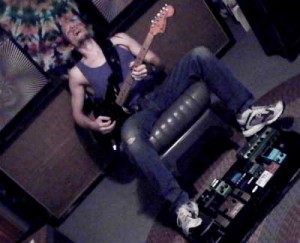 I’ve learned how to play guitar on recording sessions; I’m good friends with some of the finest musicians on the planet; I’m earning a living from my craft. But where’s the self-expression within all of this? Don’t get me wrong, there’s plenty of good music involved in what I do. But a lot of the music I do for pay is the result of somebody else’s expression, and at times, lacking a personal connection to me.
I’ve learned how to play guitar on recording sessions; I’m good friends with some of the finest musicians on the planet; I’m earning a living from my craft. But where’s the self-expression within all of this? Don’t get me wrong, there’s plenty of good music involved in what I do. But a lot of the music I do for pay is the result of somebody else’s expression, and at times, lacking a personal connection to me.
So last fall I finally decided it was time to follow ol’ Ds advice – “Pick a night, book a gig, and go make some music with your buddies.” I’m not sure if it’s just because I’m getting a little older and my priorities are changing, or because working as a freelance musician allows you to be a part of everything, without actually belonging to anything, but making some music for the soul on a regular basis with my friends is now a big priority for me.
While I’m making my living as a hired gun within the country side of this town, I have a new found love for my side project “Endless Boogie”, a band project that has no goal other than to simply provide me and my buddies with a night or two a month of self-expression through fun music. My good friends Fran Breen, drummer extraordinaire originally from Ireland (with the accent to prove it), and Mike Chapman, bad-ass bassist and member of Garth Brooks’ famed session band, the G-Men, were the first players I called for the gig. Even though they’ve both been here far longer than I, perhaps their love of just getting out there and playing is even more telling about working as a career freelance musician long-term.
A few months ago, when we did one of our first gigs at the Fillin’ Station in Kingston Springs, another player that new Mike walked in mid-set. He seemed surprised to see Mike on this “outside the microscope” gig and asked “What are YOU doing here?” Mike’s reply was honest and telling – “I’m playing.”
To me, this simple exchange says it all. What should have been obvious to the other fellow wasn’t. Not every gig has to be about money, prestige, or opportunity. While my buddies and I know the importance of a little music for the soul, it is easy to understand how a lifetime of working in the music industry can change that.
So what are you waiting for?
“Pick a night, book a gig, and go make some music with your buddies.”
Endless Boogie will be playing tonight, Tuesday, January 18 at the 12 South Tap Room, located next to Mafioso’s on 12th Avenue South, Nashville, TN. The show starts at 9 PM and we will be playing some of our favorites from Hendrix, Allmans, Santana, Muddy, and Miles, plus a few of our own. The tap room is one of the coolest “non-Nashville” bars in Nashville and has a great menu, friendly staff, a whole bunch of fancy beers on tap, and never a cover.
12 South Tap Room
2318 12th Ave South
Nashville, TN 37204
615-463-7552
Ask any musician or songwriter that’s been in Nashville for a while if they’ve ever heard of, or been to the Fiddle and Steel and most will  say yes, for sure. The Fiddle and Steel Guitar Bar, aptly dubbed “The Steel”, is located in historic Printer’s Alley off of Church Street and has been a staple of the Nashville nightclub scene since 1996. This homey, rustic club, often referred to as “the cheers” bar of Music City, is a place where musicians, artists, tourists, and locals gather to enjoy great music, see old friends, and make new ones. The Steel has also been a launching pad for some of the biggest artists in country music today, including Rascal Flatts, Eric Church, and many others.
say yes, for sure. The Fiddle and Steel Guitar Bar, aptly dubbed “The Steel”, is located in historic Printer’s Alley off of Church Street and has been a staple of the Nashville nightclub scene since 1996. This homey, rustic club, often referred to as “the cheers” bar of Music City, is a place where musicians, artists, tourists, and locals gather to enjoy great music, see old friends, and make new ones. The Steel has also been a launching pad for some of the biggest artists in country music today, including Rascal Flatts, Eric Church, and many others.
To many musicians working within the Nashville music industry, the Steel is a special place, kind of a home away from home. The club’s owner, Alison Bradsher, takes great pride in creating a vibe that is comfortable and relevant to music industry types, while still appealing to locals and tourists. The club has a decent PA system and one of the best sounding stages in the city, making it a desirable room in which to perform. In line with the clubs friendly nature, guest musicians and singers sit in regularly with the house bands, a tradition that dates back to the clubs earliest years.
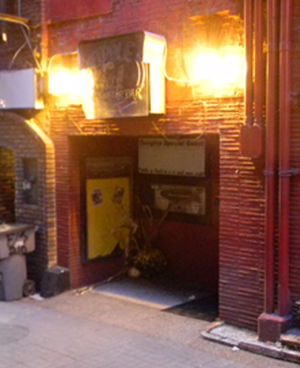 Over the years, many Nashville players and artists have established friendships and relationships at the Steel that have helped their careers, often leading to other gigs, touring and recording work, kind of a “gateway club” for some. So it’s no wonder that a couple of visits to the Steel by my wife and I during our “Nashville field trip” in 2002 helped prompt us to move here in the first place.
Over the years, many Nashville players and artists have established friendships and relationships at the Steel that have helped their careers, often leading to other gigs, touring and recording work, kind of a “gateway club” for some. So it’s no wonder that a couple of visits to the Steel by my wife and I during our “Nashville field trip” in 2002 helped prompt us to move here in the first place.
During my first year in Nashville we were pretty steady regulars at the Steel, hardly missing any of the Tuesday night jams hosted by Ronnie Pittman, and frequenting the club as often as we could. By September of that year I was gigging regularly with Ronnie on Mondays at the Second Fiddle on Broadway while playing in Kentucky on the weekends, and it was during this time that I first met Frank Taylor, a talented singer and songwriter who frequented the Steel quite a bit back then. A deep-rooted part of the club’s fabric, Frank was one of the very first singers to ever perform at the Steel, and whenever he was around; his presence only seemed to further enhance the charm of the place.
So when he asked me if I would be interested in playing guitar for him at his regular Saturday night gig there, of course I said yes. He’s a great singer and audiences related to him, the club was a great hang, and I was ready to take the next step in my Nashville evolution – pretty much a 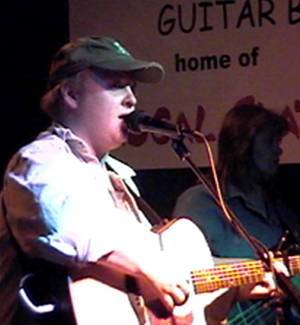 no-brainer. So I gave notice to my house gig in Kentucky and started playing every Saturday night at the Steel.
no-brainer. So I gave notice to my house gig in Kentucky and started playing every Saturday night at the Steel.
I’m not sure how this lineup came to be, but our band consisted of Frank on lead vocals and acoustic, Jack Gavin on drums, Brenda Clarke on bass and vocals, Steve Poole on keys, and me on electric guitar and vocals. It was a great lineup, we gelled well. Every Saturday night I would park in a nearby parking garage and wheel my gear down the old cobblestone street of Printers Alley, past the Bourbon Street Blues and Boogie Bar, and into the Steel. Every gig was an adventure, you never knew who might show up or what we might attempt, so I was genuinely excited to 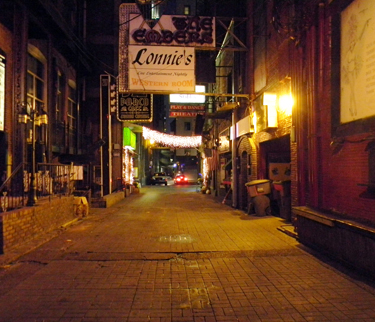 play.
play.
Frank isn’t the typical country singer; he has a unique angelic quality to his voice – soothing, soulful, yet compelling and almost hypnotic. He sang songs by artists like Vince Gill, Delbert McClinton, the Eagles, Jimmy Buffett, CCR, all of course with his own spin. He could make you laugh too. At least once a night he would say something like “Kelly’s coming around with the tip jar, and this is how we make our living in Nashville. If you could just spare a few dollars, I’ll be able to pick up some Krystal burgers for my daughter on the way home. Please throw in some money so I can feed her, she hasn’t eaten all day.” This was especially funny to anyone who knew Frank, as he didn’t even have a daughter.
Frank genuinely enjoyed singing and entertaining and this feeling was infectious, usually spilling over into the other players, the crowd, and the staff. After playing a good long hour or so for our first set we would take a break, and then, during the second set, we would get up any players and singers that wanted to sit in. The guests could range from some young aspiring singer on vacation from out of town, to touring musicians on hiatus, to artists like Joe Nichols or Toby Keith. Even the occasional tourist who wanted to sing Margaritaville was welcome on our stage (although most of the tourists had no business performing anywhere other than in a karaoke setting).
So that’s how I spent my Saturday nights for quite a while. We never had a rehearsal and didn’t really hang out together outside of these 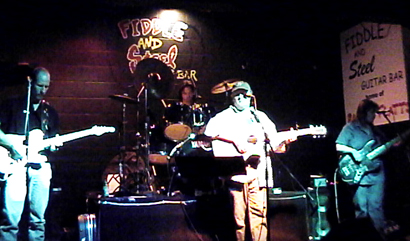 gigs, but we were a unit. By the time a couple of months had passed, this band was tight! Sometimes one of us would have to sub out our gig for something more lucrative, and eventually a couple of the other players moved on, but for a while, this lineup held together. And while I wasn’t making a lot of money, I was having tons of fun, gaining experience, and making contacts. By the middle of the summer of 2003 I was offered a road gig that I couldn’t turn down, and had to give Frank my notice. Ironically, the road gig came about through a friendship I had made at the Steel.
gigs, but we were a unit. By the time a couple of months had passed, this band was tight! Sometimes one of us would have to sub out our gig for something more lucrative, and eventually a couple of the other players moved on, but for a while, this lineup held together. And while I wasn’t making a lot of money, I was having tons of fun, gaining experience, and making contacts. By the middle of the summer of 2003 I was offered a road gig that I couldn’t turn down, and had to give Frank my notice. Ironically, the road gig came about through a friendship I had made at the Steel.
Looking back, those seven or eight months I spent at the Steel with Frank and the gang were among some of the best times I’ve had in Nashville. We may have all been on our own separate paths, searching for the next big gig, publishing deal, or connection, but once a week our paths crossed and we came together to play music and forget about our life struggles. Time stood still at the Steel on those nights and it seemed like those moments would last forever. Since those days, everyone that was in that band has moved on to different gigs. Isn’t it funny how life’s circumstances bring people together for a common purpose only to eventually spread us apart again like ash strewn to the wind. Even though I haven’t seen or spoken to some of my comrades at the Steel since those days, I’ll always have great memories of those times. For me, that’s what a great night club experience, or life for that matter, is all about – sharing good music and fun times with good friends, even if only for a brief moment. Thanks Frankie!
It was sometime in the fall of 2002 and my wife, Kelly and I were attending our weekly Tuesday night outing at the Fiddle and Steel. Already having sat-in earlier in the night, we were getting ready to leave as it was getting kind of late, when Ronnie Pittman, the singer and host of this unofficial jam night, approached us at the bar. “Hey man, I need a guitar player to play some Monday nights with me at the Second Fiddle. Are you interested?” he asked. “I’d love to, thanks for asking.” I replied, further adding “One thing I should tell you upfront is that I’m not totally up on all the old country stuff yet.” “That’s no problem; we don’t do that many old country tunes. And besides, the last thing I need is another guitar player that constantly plays ‘dubadibby dabaduboo dubadibby dabaduboo’.” he explained, mimicking a cliché sounding rapid-fire guitar lick. “Great, I’m there!” I exclaimed.
The following Monday I arrived early to the Second Fiddle on Broadway, double parked to load in my gear, and then drove around for 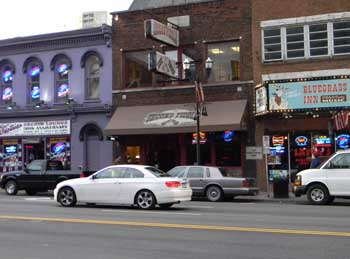 about 20 minutes looking for a free parking space. After setting up my stuff and hanging for a bit with Ronnie and the band, our night of music began. Ronnie played a mix of contemporary country ranging from Travis Tritt to Little Texas, some 80s and 90s country/pop from groups like Exile, a few old school country tunes, R&B from the likes of Delbert McClinton and Van Morrison, and some classic rock from groups like the Eagles, the Allman Brothers, and Steve Miller. His wife also sang harmony and lead vocals and fronted the band on a few songs by artists like Martina McBride and the Dixie Chicks.
about 20 minutes looking for a free parking space. After setting up my stuff and hanging for a bit with Ronnie and the band, our night of music began. Ronnie played a mix of contemporary country ranging from Travis Tritt to Little Texas, some 80s and 90s country/pop from groups like Exile, a few old school country tunes, R&B from the likes of Delbert McClinton and Van Morrison, and some classic rock from groups like the Eagles, the Allman Brothers, and Steve Miller. His wife also sang harmony and lead vocals and fronted the band on a few songs by artists like Martina McBride and the Dixie Chicks.
I knew a lot of the material and managed to feel my way through the songs I didn’t know. We played a couple of long sets with a break in the middle and, although people wandered in and out of the club all night, I don’t think the crowd ever got above 15 or 20. Nevertheless, the music was enjoyable and we all had a good time playing. At the end of the night I tore down my gear and waited for Ronnie to count the tips (I think the grand total was something like $28 apiece including the base pay of $20 each). The short pay was all right with me, as I was still trying to gain experience and make connections. Ronnie thanked me and asked me if I wanted to play the following Monday, which of course I did, and told him so.
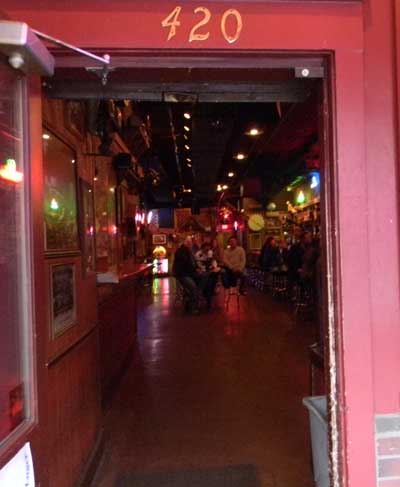 So this became my first regular in town gig. And it was perfect. Ronnie was a real laid-back singer to work for, he always had a decent rhythm section, and his repertoire consisted of a lot of pop, rock, and R&B; styles I was already familiar with. He did play just enough contemporary and classic country for me to explore my new chops in that area as well.
So this became my first regular in town gig. And it was perfect. Ronnie was a real laid-back singer to work for, he always had a decent rhythm section, and his repertoire consisted of a lot of pop, rock, and R&B; styles I was already familiar with. He did play just enough contemporary and classic country for me to explore my new chops in that area as well.
Gigging with Ronnie also created some other opportunities. After a month or so of these gigs I did an out of town weekend with Ronnie and his band in Georgia. It was on that gig where I met a keyboard player Ronnie had hired named Gordon, and it was through Gordon that I landed the house gig at Libby’s in Kentucky.
Another connection I made was through one of our regular attendees, a truck driver named ‘Bud’ who worked for Charlie Daniels and took a liking to my guitar playing. He stopped in for our gig once in a while when he was in town, eventually hooking me up with a friend of his who had an indie band called “The Watercolor Project”. I wound up doing some recording sessions with this trippy rock band, a project and genre that allowed me to gain some studio experience in a far more relaxed setting than my virgin studio outing , a debacle that almost sent me packing a couple of months prior.
So I was getting my country/pop thing happening by gigging with Ronnie on Monday nights, and honing my chops on traditional country on the weekends in Kentucky. While it was a lot of activity it still didn’t add up to enough to pay the bills, so I was still working the eBay/pawn shop angle pretty hard. One of my eBay sales, that of an old Tube Screamer that I sold for $75, was bought by another Nashville guitarist who suggested meeting in town to buy the pedal rather than shipping it. I e-mailed him about meeting at my Monday night gig, and the following week he arrived to do the transaction. This led to one of the biggest eye openers I had in that first year.
I arrived downtown for my regular Monday night gig with Ronnie and set up my gear. After the first set I was still standing on the stage for a few minutes when a long-haired fellow approached me. “Are you Eric?” he asked. “Yes.” I answered “You must be Mark.” After exchanging a few brief words I presented him with one slightly beat up Ibanez Tube Screamer and he paid me $75 in cash. He then asked 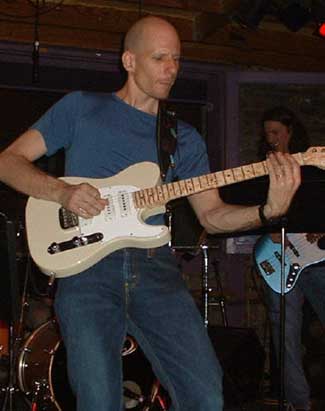 me how long I had been in town, to which I answered “I’ve been here for about six months.” He reacted with surprise, acknowledging my accomplishments with “Wow, that’s great. Six months and you’re already gigging.” He then added “I’m still working towards playing out, I’m not quite there yet, but I’m getting close. I’ve been in a couple of different bands so far, but nothing that’s made it out of the practice hall yet.” “How long have you been here?” I asked innocently. “Five years.” He answered and a deafening silence engulfed the moment.
me how long I had been in town, to which I answered “I’ve been here for about six months.” He reacted with surprise, acknowledging my accomplishments with “Wow, that’s great. Six months and you’re already gigging.” He then added “I’m still working towards playing out, I’m not quite there yet, but I’m getting close. I’ve been in a couple of different bands so far, but nothing that’s made it out of the practice hall yet.” “How long have you been here?” I asked innocently. “Five years.” He answered and a deafening silence engulfed the moment.
The stark reality that there are musicians trying to find their way in Nashville that are here for years had yet to stare me in the face with such clarity. It was almost as if an atomic bomb had been dropped right outside of the club. “I’m sorry to hear that, best of luck to you with that.” I mean, what else can you really say? A minute or so later we said goodbye, and the long-haired struggling stranger sauntered out the door.
For me, that moment clarified a lot of things. It made me realize that there are far more musicians here than there are opportunities for them. It reaffirmed some of the advice I had received from my mentor, D, one piece being “Whatever you do, don’t join a band, band’s starve.” It made me further appreciate the fact that I was lucky enough to have a mentor here in the first place. It allowed me to view all of my gigs and performance opportunities with much more optimism. And it made me realize, in a town where so many struggle, just how fortunate I had been so far.
It was the fall of 2002, I’d been in Nashville for a few months, and had just landed a weekend house gig at Libby’s Steakhouse in Kentucky, a great country music venue in which I could hone my chops. I was spending most of my days selling stuff on eBay, driving around to pawn shops looking for more stuff to sell on eBay, and practicing, practicing, practicing. My recent debacles on Broadway and at a recording studio on Music Row revealed to me that I had a lot of work to do, and this prompted me to get really organized about my practice regimen. While I was still going to downtown Nashville one or two nights a week to network, making the Tuesday night jam at the Fiddle and Steel a regular stop, these weekly outings on the town mainly served to build connections, not so much to sit-in. I needed to improve my country chops quite a bit before I would be comfortable enough to put myself out there on the chopping block again.
So every Friday around dinnertime I would set out for Daysville, Kentucky, sometimes accompanied by my wife, sometimes not. Each weekend outing at Libby’s would introduce me to new material, and I would obtain recordings of these songs to work on over the following week. In addition to learning these songs and other standards I heard around town, I was digging in hard to my technique in general, practicing country rhythm, chicken pickin’, Western swing and, to avoid losing any ground, a little rock, blues, and jazz as well. A friend of mine had given me a CD of some old-school country tele players, Bill Kirchen and Redd Volkaert aka the Twang Bangers, and I listened to and tried to mimic their lines, style, and feel. I also did the same with recordings of Alan Jackson that featured Brent Mason.
To create a challenging way to practice all these new techniques, I burned a mix CD comprised of several country, western swing, and bluegrass tunes. The 11 song guitar workout CD covered nine different keys, a variety of tempos, and several different feels (straight eighths, swing, etc).
|
Key |
Song |
Tempo/Feel |
|
D |
Goodhearted Woman |
slow eighths |
|
E |
Folsom Prison Blues |
medium eighths |
|
F |
Truck Drivin’ Man |
fast eighths |
|
Bb |
Chase Each Other Round the Room |
medium swing |
|
G |
How Mountain Girls Can Love |
fast eighths |
|
Ab |
Workingman Blues |
medium eighths |
|
A |
Poultry in Motion |
medium eighths |
|
G |
She Loves Anything |
fast eighths |
|
Bb |
White Lightning |
medium eighths |
|
B |
I Don’t Think Hank Done It This Way |
medium eighths (Waylon Stomp) |
|
F |
Quit Feelin’ Sorry |
medium swing |
Prior to moving to Nashville, I had never used the chicken pickin’ technique, and as it was the weakest link in my chain, it was the technique I practiced the most. This technique is a hybrid way of picking the strings on a guitar. Holding the pic between your thumb and first finger,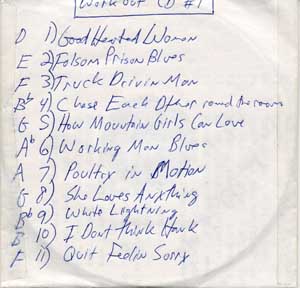 you alternate between picking the strings with the pic, and plucking the strings with either the third finger or second and third finger. This is also commonly referred to as “the claw”. Both rhythm and lead lines can be played with this technique, and practicing along with this CD, without pausing in between songs, somewhat emulated the pace and variations that might happen while performing with a live band.
you alternate between picking the strings with the pic, and plucking the strings with either the third finger or second and third finger. This is also commonly referred to as “the claw”. Both rhythm and lead lines can be played with this technique, and practicing along with this CD, without pausing in between songs, somewhat emulated the pace and variations that might happen while performing with a live band.
Every day I worked diligently in my basement music room, practicing country music standards and technique. I would practice until my right hand felt like it was falling off, or until I felt like throwing my guitar through the window, always managing to stop just prior to either thing happening. My improvement was slow, but steady, and gradually the other players at my weekend gig began to notice. I would practice and do the eBay thing all week long, go downtown to network for a couple of evenings, and head off to Kentucky for the weekends.
Libby’s was a family kind of place with a relaxed atmosphere and served no alcohol. But this didn’t stop some of the band members, me occasionally included, from sneaking a beer or two out back before the shows and during breaks. Hey, we were playing country music at a steakhouse in Kentucky; I don’t think Merle or Hank would disapprove. In all fairness to Libby, who was trying to run this show as professionally as he could, everyone seemed to keep the Budweiser buzz to a dull roar, always making a strong performance the priority (okay, maybe a few times the steel player got a little too loopy and hacked a little). But Budweiser or not, we had a great time. The players and the guest singers always gave it their all, and the crowd, no matter how big or small, always showed appreciation.
I worked at Libby’s for about four or five months through that fall and winter and, in hindsight, it was the best thing that could have happened to me at that point in time. By early spring I felt ready to dig in full bore to the country scene in Nashville and gave my notice. Libby understood why I had to leave, thanked me for my time, and wished me luck.
A couple of years later I was gigging at Tootsies and ran into one of the girls who had been a regular guest singer at Libby’s. Sadly, she informed me that Libby had just passed away at the age of 65. We reminisced about what a great time we always had back in the day, and how much he had cared about music and people. Libby was a sweet old guy and had treated me with the utmost respect. He gave me a chance when I needed it. I will always look back on those days with fondness, and will be forever grateful to have known Libby Knight.
D – Goodhearted Woman slow eighths
E – Folsom Prison Blues medium eighths
F – Truck Drivin’ Man fast eighths
Bb – Chase Each Other Round the Room medium swing
G – How Mountain Girls Can Love fast eighths
Ab – Workingman Blues medium eighths
A – Poultry in Motion medium eighths
G – She Loves Anything fast eighths
Bb – White Lightning medium eighths
B – I Don’t Think Hank Done It This Way medium eighths (Waylon Stomp)
F – Quit Feelin’ Sorry medium swing
As my first summer in Nashville was drawing to a close, I was basically jobless, running out of savings, and fast realizing that I had a long way to go to become proficient at playing country music, a style that was quite new to me. For many newcomers to Nashville, sitting in, gigging, and networking around town can make you feel like you are under a microscope, as was also the case for me. I had converted the basement of my rented home in Gallatin into a studio where my daily ritual consisted of learning country standards and practicing my chicken pickin’ technique (I was also conducting an eBay campaign and gradually selling off everything I could stand parting with). But all this practicing alone wasn’t enough. I needed some practical live experience but, after my recent debacle on Broadway, needed to accomplish this outside of the microscope for a bit. So when I got a phone call from Gordon, a keyboard player I had recently met, about playing in a house band for a country music talent show in Kentucky, I jumped at the offer.
Libby Knight, owner of Libby’s Steakhouse in Daysville, Kentucky, had been a longtime supporter of country music, hosting his talent show “Live at Libby’s” since 1984. During the show’s heyday there was a live radio broadcast, and it was from this venue that many singers like Garth Brooks, Tracy Lawrence, JoDee Messina, Trisha Yearwood, and others once performed in obscurity, some, arguably getting their start there (it is rumored that at one time record deals for some artists began to take shape in the front lobby). The boom days of this once would-be Opry style country music house now long gone, this was the perfect low-pressure opportunity I needed to hone my country chops.
During my phone call with Gordon, he explained to me that the Friday night show was an audition night for singers. Libby would pick the best vocalists to come back and rehearse with the band Saturday afternoon from 1 to 4, after which the band would be provided a dinner followed by the Saturday night concert from 8 to 11. For our services, each band member would receive $100 total for both nights. While this was not the greatest pay, I didn’t mind as I greatly needed the experience. Not to mention that a hundred dollars was a lot more than I was earning on most weekends at this point in time, which was typically nothing. Of course my first weekend at Libby’s was an audition for me as well. I had already done a gig with Gordon and he liked my playing, but the band leader had yet to hear my playing and I would have to win him over to be offered a regular spot.
I left Gallatin late in the afternoon on a Friday to make the hour and a half drive north into Kentucky. The scenic drive was mesmerizing at times as I found my way through a maze of picturesque back roads laced with cornfields, cattle grazing across rolling pastures, and the occasional small town. I arrived to the rural community of Daysville and pulled into Libby’s, a long barnlike structure that sat adjacent to a large field and reeked of another era. After loading in my gear and meeting Libby and the other musicians, I went over to a long row of tables at which several of the players had gathered, organizing their charts. “We’ve got charts for pretty much everything we’ll be playing.” said Gordon “Here’s a set list that shows the order of the singers, and the songs they’ll be doing.” I grabbed my charts, put them in order, and got ready to play.
Libby was a colorful character, upbeat and generally excited about these events, and this enthusiasm was evident a little while later when the show began with his announcements. Well dressed in a white shirt, Wrangler jeans, cowboy boots, and 10 gallon hat, he spoke from side stage with a deep resonant voice infested with a thick southern drawl and introduced the show as if it were the Grand Ole’ Opry. He disappeared behind the curtain while the audience was still applauding and we were off and running. After the first two songs, which featured the house band, he returned to announce the first vocalist to audition. We began playing the intro to ‘Walkin’ After Midnight’ as he walked off and an attractive young lady dressed for success walked onto the stage and saddled up to the mic. The band, which was comprised of some great players, was instantly cookin’, the young lady sang well, and the song was well received. Libby returned to the stage to rally some more support from the crowd and announced the next singer.
The material we played throughout the night was a mix of classic and new country, and the Nashville style number charts were of immense help. Some of these songs I knew, many I had heard but never played, and some were completely foreign to my ears. For the songs that required a lead guitar intro that I didn’t know, the bass player helped me out by humming the phrase right before the count off. All in all, I played well, enjoyed playing with the other musicians and singers (maybe not all of the singers), and everyone seemed to like my playing. We played two long sets with this format which had a surprisingly smooth flow, largely due to Libby and the band leader’s organization, and the night came to an end.
I returned the next afternoon for the rehearsal and ran through tunes with the best singers chosen from the night before. Each singer was allotted two songs for Saturday night’s show, so we spent much of this time learning songs we hadn’t played the night before. The rehearsal was kind of long, but the atmosphere was relaxed. We broke for dinner, a feast which consisted of your choice of one of Libby’s famous steaks or fried catfish with sides of baked potato, hush puppies, coleslaw, and sweet tea – a Southern delight. Making the mistake of over-eating, or perhaps just underestimating the fat content of this meal, I felt a bit “heavy” after dinner so I attempted to walk some of it off in the parking lot before the show.
A little while later I was back at the “chart table” with the other players organizing my stack of charts for the night. At eight o’clock sharp we were off and running after another excited send-off from Libby. Similarly to the night before, everything went real smooth. Vocalist after vocalist took the stage – young ladies sporting big hairdo’s and dressed in evening gowns, men clad in jeans, plaid shirts and cowboy hats, a couple of teenage prodigy’s – even an elderly gentleman in his 60’s sang country classics giving it their all. The crowd was attentive and even sang and clapped along at times. Adding an element of showbiz to the night, Libby would walk out from behind the curtain every once in a while and raise his arms in the air to incite additional applause after modulations and solos.
Just as we did the night before, the band played great, and most of the singers were excellent. The afternoon rehearsal allowed the band and singers to become comfortable with the material and really dig in during the show. Nothing like the helter-skelter nature of the in-town Nashville club scene, this gig was relaxed and outside of the microscope, but still had a professional edge.
I left the gig in good spirits and made the long drive home. It would be a little while before I was asked to return as I was subbing and the other lead player had not yet made a permanent exit, but a few weeks later I was asked to become a permanent member of the house band. I had passed the audition and landed what turned out to be the perfect gig for me to hone my country chops. Live at Libby’s – country music basic training!
During the summer of 2002 I was aggressively exploring the live music scene of Nashville. Upon the recommendation of my friend, D, I was regularly making the rounds at clubs on Broadway, Printers Alley, and other spots around the city to better understand the scene, and to begin building the relationships I would need to succeed here. For the most part I was in kind of a watch and learn mode, often finding a table with my wife at the back of these clubs and just listening to the performers, sometimes even writing down the names of unfamiliar songs on napkins to learn later. Most of my musical background is rooted in rock, blues and jazz, so the repertoire played by most of these artists and bands, being mostly country, was largely foreign to me. Not to mention the art of country guitar playing, partly based on a technique called “chicken pickin”, was something I had yet to conquer.
I had already successfully sat in on a few occasions, carefully choosing situations that would allow me to showcase on songs and styles that were familiar to me, but for the most part I had avoided sitting in with bands that played mainly country. D had conveyed to me the importance of slowly building a great reputation – “Good news travels slow, but if you fart on stage they will immediately hear about it all over town.” So I was slowly and carefully building my reputation. But this cautious approach prevented me from sitting in on many occasions, fearful that I would get in over my head. D respected the fact that I was being cautious, but he also knew that I was beginning to become pigeonholed as a rock player as I never sat in on country tunes. So maybe that was part of the reason he invited me to a 6 to 10 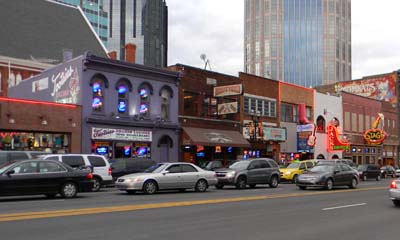 shift he was playing on a Saturday night in the front room of Tootsies.
shift he was playing on a Saturday night in the front room of Tootsies.
My wife, Kelly, and I arrived downtown around seven o’clock and found a parking spot. The summer air was hot and thick and people were out in abundance. We walked into Tootsies, which was packed to the gills, and found a spot to stand near the bar a few feet from the tiny stage. D spotted us and gave me a nod. He was playing with a stripped down Broadway unit of drums, bass, and guitar, fronted by an otherwise typical looking country singer sporting a cowboy hat, cowboy boots, denim shirt, and Wrangler jeans. The band was cranking out country standards in rapid succession, the tempos were fast, the music was loud, and the crowd was partying heavily. After an hour or so D looked over at me and said “Do you want to play a couple?” Feeling that I needed to rise to this occasion, I nodded yes and walked over to the stage.
As I hopped up on to the overcrowded stage he handed me his guitar and said “Just ask the bass player if you don’t know the changes, he’ll help you through.” I had just barely strapped on the guitar when the singer shouted out “OK boys, Rocky Top in G”, a country standard I 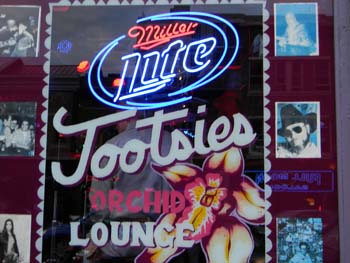 had heard on several occasions but had yet to play. It just so happened that the singer was playing an acoustic and, as the first verse is just acoustic and vocals, this gave me time to figure out the chord progression. So when the whole band came in after the first chorus, I was right there with them, sort of. While I did manage to improvise, or fumble, my way through the first solo without any glaring problems, apparently I was a little heavy handed on the rhythm of the next verse, probably due to years of playing in rock bands combined with almost no experience playing country. D motioned from his spot at the bar to hush my volume a little and I attempted to do so. I managed to get all the way to the end of the main part of the song, hanging on by a thread, before it began to get ugly.
had heard on several occasions but had yet to play. It just so happened that the singer was playing an acoustic and, as the first verse is just acoustic and vocals, this gave me time to figure out the chord progression. So when the whole band came in after the first chorus, I was right there with them, sort of. While I did manage to improvise, or fumble, my way through the first solo without any glaring problems, apparently I was a little heavy handed on the rhythm of the next verse, probably due to years of playing in rock bands combined with almost no experience playing country. D motioned from his spot at the bar to hush my volume a little and I attempted to do so. I managed to get all the way to the end of the main part of the song, hanging on by a thread, before it began to get ugly.
For those of you unfamiliar with this Broadway classic, the main body of the song is played with a half-time feel, the song modulates up a whole step, and then the song kicks into double time for a long-winded fiddle solo outro. So, being the only soloist in this situation, it was my job to mimic the fiddle solo, and I managed to do so quite poorly. While I had been practicing my chicken pickin’ technique daily for a couple of months by this point, this was probably my first practical application. I quickly learned that practicing this style with a metronome or CD at home, and improvising a would-be fiddle solo at warp 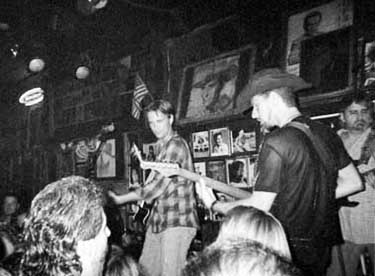 speed with a band in a nightclub are two different things. No matter what I heard in my head, my fingers just wouldn’t do it. I hacked, chopped, and butchered my way through two long choruses that seemed to drag on for eternity.
speed with a band in a nightclub are two different things. No matter what I heard in my head, my fingers just wouldn’t do it. I hacked, chopped, and butchered my way through two long choruses that seemed to drag on for eternity.
The song ended and the crowd of tourists cheered, completely oblivious to my train wreck. But I am certain that the other players on stage did hear every single ugly note I played. D certainly did as he quickly came to my rescue, snatching the guitar from my hands before I could do any more damage. “That one got away from you a little bit.” he kindly said as I left the stage. Feeling less than excited about hanging around after this awkward moment, we left after a couple more songs.
The next day D called me and we spoke about my debacle. “I think you should stay away from Broadway for a little while, at least until you get a little more familiar with the songs and the style. The guys I was playing with last night are cool and know you’re still learning, so there’s no harm done there. But you definitely don’t want to want to do anything like that again.”
I had already been playing guitar for over 20 years and could play rock and blues as good as most. But country music wasn’t yet in my vocabulary, and chicken pickin’ was as foreign to me as French Morocco. It was like learning how to play guitar all over again. That one train wreck made it apparent to me that I was going to have to practice for three to four hours a day for quite a while to learn this new language. So that’s just what I did. I obtained recordings of as many country standards as I could and burned mix CDs. I began dissecting the songs, writing number charts for them, learning arrangements, rhythms, solos, even bass lines. As chicken pickin’ is essential to traditional country guitar playing, I followed one piece of great advice from D “Put on a CD of old-school country and improvise solos over entire songs using the chicken pickin’ technique.” I forced myself to do this and, although I sometimes felt like throwing my guitar through the window, slowly began to see improvement. I was determined to never have another moment like my debacle on Broadway ever happen again. And while I did eventually get the hang of chicken pickin’, to this day, I still cringe every time I hear Rocky Top!
The names of some of the musicians in this story have been changed to protect the innocent guilty.
I first arrived to my new home in Gallatin, TN, some 30 miles north of Nashville on a warm summer night in June of 2002. My family and I had just spent two days driving across the country with all of our personal belongings stuffed into the back of a rented Ryder truck and, despite being exhausted, we unloaded the truck at about 8 PM before collapsing into a deep sleep. All I knew about this new world called Nashville was the vague description of a gigantic music community conveyed by my friend “D”, a world which I knew little about, but one I needed to explore quickly. While we did have some savings, employment was a priority, so after a day of unpacking, we ate dinner, took showers, and headed for the city to start getting acclimated.
At some point during the drive in we stopped and picked up a copy of “The Scene”, Nashville’s biggest arts and entertainment newspaper. The words “Open Blues Jam 9 to 1 at The French Quarter” seemed to be calling my name from a section of club listings, and that would be our first stop. We walked into the dimly lit room to see a crowd of 10 or 12 listening to a four piece band meandering through some blues standards. After a while they called me up and, not knowing a soul in the place, I played two or three songs which, to my relief, were well received. Upon returning to my table, a moderately well dressed gentleman approached me and said “Hi, my name is Freddie. I really enjoyed your playing. I’ve got my own band and we are in need of a guitar player. Are you looking for a gig?”
I couldn’t believe what I was hearing. Fresh off the boat and without a job in site, this seemed too good to be true. Now keep in mind that I still didn’t know how the Nashville music scene or community worked, so any gig being offered seemed like a good thing. “Yeah, I’m definitely interested in doing some gigs.” And with that we exchanged phone numbers. Of course I would later learn that in Nashville not all gigs are created equal (more on that later). After chatting with Freddie for a while the next day I accepted his three or four upcoming local gigs and agreed to attend a few rehearsals with his band to prepare. The next day I met him at a Mini Mart where he gave me a CD of his material. Always wanting to be prepared, I went home and anxiously dug in. This was where I would receive my first surprise.
After popping the disc into my CD player I began to listen to a marginal recording of my new “band” and was a bit disappointed. The songs weren’t all that great, the musicianship was average at best, and the vocals were downright scary. “Well, maybe they’ll sound a little better live.” my wife, Kelly, optimistically encouraged. I learned the stuff and showed up for my first rehearsal at Freddie’s home south of Nashville, guitar and amp and hand. Shortly after rehearsal began it became apparent to me that the level of musicianship in this band was unlike what I had previously heard at the Fiddle and Steel and other clubs around town when visiting the city a few months prior. And when I say “unlike” I don’t mean in a good way. Again, I chalked it up as “Maybe they’re holding back because it’s a rehearsal and will sound better live.” Of course in hindsight, I should have known better, but hey, I was new to town and just happy to have some gigs lined up.
That brings us to our first gig a couple of weeks and uninspired rehearsals later (and by the way, I did get paid something like $15 per rehearsal for gas money). The Radio City Café is a small, but friendly bar somewhere on the east side of the city, and while being inside the club itself felt fairly safe, the surrounding neighborhood streets did not. The other band guys were already there and, running a little late due to getting lost in this still unfamiliar city, I quickly set up my gear after a brief reprimand from Freddie for my tardiness. Then Freddie said “Okay everybody, let’s have our preshow band meeting backstage.” We followed Freddie to the “backstage“ area (otherwise known as the kitchen of this fine establishment) to engage in Freddie’s little pep rally. “Okay everybody, we’re going to play the first two songs back to back and then I’ll address the crowd. We’ll play the third song and then I’m going to tell a joke. At the end of the joke I want you (points at drummer) to play a little ‘ba dat boom’ you know, like they sometimes do on the late show. Keep an eye on your set lists, I’ve made notes where I’m going to pause to speak and tell jokes.” Oookaaay. “And one more thing, I want everybody to walk out onto the stage in the right order, in other words, Joe, because you’re on the furthest side of the stage you should go first.”
This all seemed a little overproduced and over-the-top for the gig at hand, but hey, you can’t fault the guy for taking this $20 dive gig in East Nashville as serious as a show at the MGM Grand. To become successful, one must project a successful image at all times, right? So we walked out onto the stage single file and barreled through the first two poorly written blues numbers, after which, the audience of my wife plus 12 went mild. Freddie introduced himself and we played the third number which was followed by his first joke. While I can’t remember the specifics of the joke, I do remember that it was long, rambling, and not the least bit funny to me or anyone else in the place. The drummer’s “ba dat boom” didn’t help much either. We dug back into a couple of more songs which, unfortunately, were also played with no more power or conviction then the weak renditions we had limped through at the rehearsals. So this was the show, we would play a couple of uninspired songs, then Freddie would tell a bad joke, a couple more songs, more bad jokes. The jokes were so bad that, after a while, you could hear groans from the crowd as soon as they realized he was going to tell one.
Still, bad jokes and all, I did manage to have some fun, after all, I was now playing in Nashville so I was pretty excited because of that fact alone. Plus, sometimes when you’re playing with a band on stage it’s hard to be objective about the overall situation. I finished out the night, loaded out my gear, got paid my $20 and hopped in the car with Kelly for the 45 minute drive home. The gig had been awkward and we began the drive with a deafening silence which I bravely interrupted by asking “So what did you think?” “Well, you were good. Freddie, not so good. He can’t sing very good, the songs are terrible, and his jokes are downright painful. The drummer was pretty bad as well.” she answered honestly. “Yeah, I was kind of afraid that’s what you’re gonna say. I guess I’ll give it one more shot.”
That one more shot turned out to be a gig back at the French Quarter a couple weeks later. It just so happened that on the night of this gig my friend “D” was playing the Opry and had invited Kelly to go along, so she didn’t arrive at my gig until near the end of the show. She didn’t miss much. While they were getting the royal treatment on the other side of town, I was living a nightmare that was literally an exact duplicate of my first gig with Freddie, only in a nicer club. I mean, it was carbon copy, the same preshow meeting, single file onto the stage, same type of milk toast performance, same bad jokes, same “ba dat boom” following the same bad jokes. Oh yes, there were a few subtle differences; this club, despite being considerably larger than the Radio City Café, had an even smaller crowd (I think six was the magic number on this night), it was in an even scarier part of town, and it had a great PA system which allowed every nuance of Freddie’s bad vocals and jokes to be heard with exceptional clarity. By this point in time Kelly and I had more thoroughly explored the Nashville club scene and had a better idea of what kinds of musical situations might lead somewhere. It was now obvious that this situation wasn’t heading in a very good direction. So by the time I was walking to my car and Freddie approached me I was basically ready to give my notice.
Then comes one last surprise. “I need $20 to pay for house sound.” He states matter-of-factly. “What? I thought you were walking out to pay me.” “No, I can’t pay you on this gig. To play here, we have to pay a house sound fee of $100, that’s 20 bucks each.” My look of confusion might have caused him to rethink his strategy and he then blurted out “I’ll tell you what, instead of paying you for the next rehearsal, I’ll just put that money towards the sound fee.” He offered. “That would be great Freddie.” and with that, we drove off, laughing all the way to the poorhouse. I called him the next day and told him that I appreciated him giving me a chance, but his band just wasn’t right for me at this point in time. I had given it my all, and while the music had been largely uninspired, it was the bad jokes that were killing me. I literally could not take one more night of those bad jokes. It was time to see what else this town had to offer.
